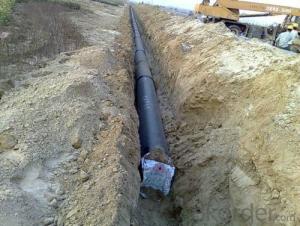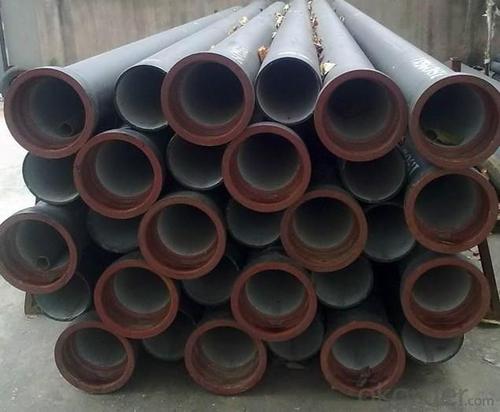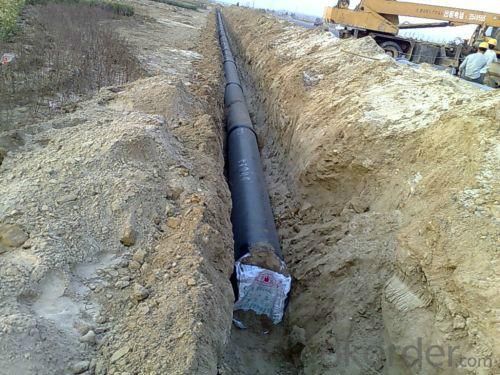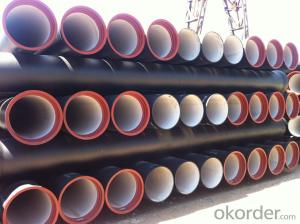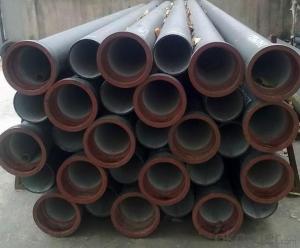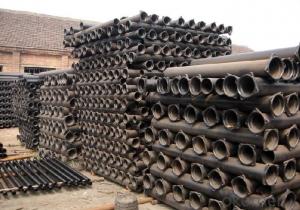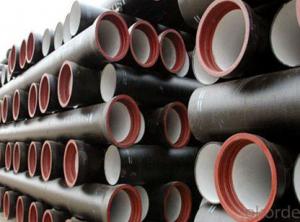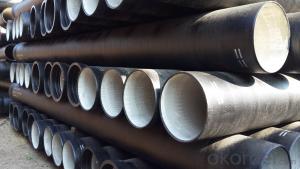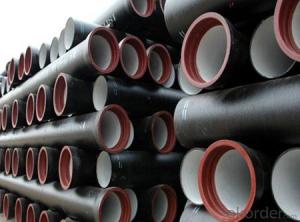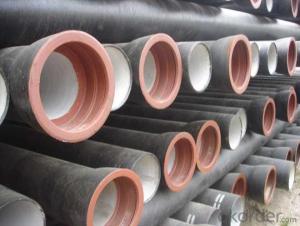Ductile Iron Pipe of China EN598 DN300-DN900
- Loading Port:
- China main port
- Payment Terms:
- TT or LC
- Min Order Qty:
- 22 m.t.
- Supply Capability:
- 50000 m.t./month
OKorder Service Pledge
OKorder Financial Service
You Might Also Like
1,Ductile Iron Pipe Description :
1) Pipes confirm to ISO2531,K9 class,T type joint,6m long,with inside cements lining conform to ISO4179, outside Zinc spraying(130g/m2) and bitumen coating(70μm) conform to ISO8179.
2) Pipe ends: Spigot and socket ends, with 100% SBR rubber gaskets accoding to ISO4633
3) we can do third party inspection according to customer's request.
4) Our products have been sold to many international market, such as Middle East and South East Asia and Africa.
2,Main Features of the Ductile Iron Pipe:
1).Quality guarantee
• Chemical checking
• NDE after rough machining
• Mechanical testing after heat treatment
• Final NDE,dimension inspected
2).Quality document
• Full Q.A document as per client request
3).Packing and Shipping
• standard export package(carton/wooden case/pallet)
• accept FOB,FAS,CNF,CIF door to door etc or customer designated shipping agent
4).Service
• Drawing: we can translate your original drawing, offer best suggestion on design
• Quality: we have full set quality control system to guarantee the best quality.
• Inspection: inspect in house, all our products must be checked 3 times before packing
3,Ductile Iron Pipe Images:
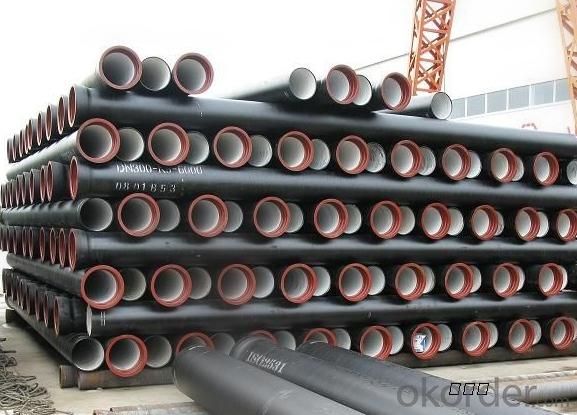
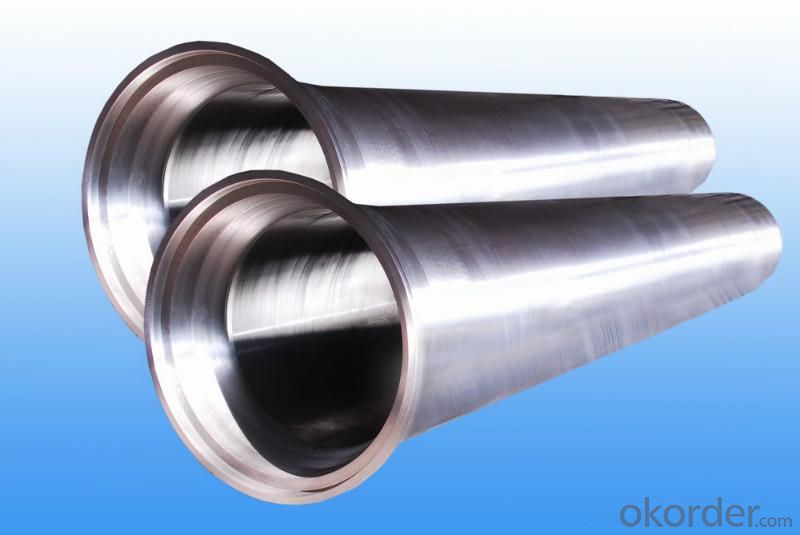
4. Ductile Iron Pipe Specification:
Surface Finishes: Bare, Oiled, Mill Varnish, Galv,FBE, FBE Dual, 3LPE, 3LPP, Coal Tar,Concrete Coating and Tape Wrap
End Finishes: Beveled, Square Cut, Threaded, hat
Additional Services: Internal Coating
Test: X-ray, UT, magnetic particle,inspection,hydrostatic test.
Processing service: Beveling, Threading, Slotting, Cut-to length, Bends, Quench and Temper, Fabrication, Double-jointing and On-site
Internal lining: ductile iron pipes shall have an internal cement mortar lining in acc with ISO4179.
External coating: ductile iron pipes shall be externally coated with metallic zinc spray plus a further layer of resin
Gasket: 100% SBR/NBR/EPDM rubber gasket in accordance with ISO4633.
Packing: ductile iron pipes from DN100 to DN300 be bundled with steel belts, others are in bulk.
Payment term: L/C, T/T.
5.FAQ:
We have organized several common questions for our clients,may help you sincerely:
1.Q: Why would you choose ductile iron pipe rather than other pipe materials?
A:The reasons are obvious for that not only ductile iron pipe possesses the inherent strength and flexibility of ductile
iron, combined with proven corrosion protection systems, but also the cost savings can be achieved from design to
installation and commissioning.
2.Q:Why can you guarantee the inner of pipes can’t be corroded?
A: High alumina cement mortar lining and sulphate-resistant cement mortar lining. These two special linings are applicable
to inner anti-corrosion for sewage pipes, improving resistance to erosion of the sewage components.
- Q: Ductile cast iron can replace copper sleeve
- The tensile and compressive capacity of the ball milled cast iron is not as good as that of copper. The hardness of Rongchang graphite copper sheath can reach HB210
- Q: Can ductile iron pipes be used in agricultural applications?
- Yes, ductile iron pipes can be used in agricultural applications. Ductile iron pipes are known for their strength, durability, and corrosion resistance, making them suitable for various agricultural uses such as irrigation systems, water supply networks, and drainage systems. They can withstand high pressure, handle heavy loads, and are also resistant to external factors like soil movements and root penetration.
- Q: Are ductile iron pipes suitable for use in wastewater pumping stations?
- Yes, ductile iron pipes are suitable for use in wastewater pumping stations. Ductile iron is a strong and durable material that can withstand the harsh conditions and corrosive nature of wastewater. It has excellent resistance to corrosion and can handle high-pressure environments, making it an ideal choice for transporting wastewater in pumping stations. Additionally, ductile iron pipes have a long lifespan and require minimal maintenance, reducing the overall cost of operation and ensuring reliable and efficient wastewater transportation.
- Q: What effect does magnesium play in nodular cast iron?
- Magnesium can be graphite precipitated in spherical form.But the specific mechanism is not clear, and now it is still debated in the academic circles.In addition, magnesium and sulfur generate MgS, which removes S from molten iron, which impedes the formation of spheroidal graphite.Therefore, Mg has two functions to eliminate the influence of S on Nodular Iron and promote the precipitation of graphite in spherical form.
- Q: Are ductile iron pipes suitable for use in industrial applications?
- Ductile iron pipes possess the necessary qualities to be used in industrial settings. They are renowned for their robustness and durability, which renders them perfect for handling the rigorous demands of industrial environments. Moreover, these pipes are resistant to corrosion and can endure high pressures and temperatures. Additionally, they exhibit exceptional resistance to impact, thus making them appropriate for areas with heavy traffic or potential mechanical damage. Furthermore, their flexibility allows them to absorb vibrations and shocks, thereby further enhancing their suitability for industrial usage. Consequently, ductile iron pipes are a dependable and cost-efficient option for various industrial sectors, including water and wastewater treatment, mining, power generation, and chemical plants.
- Q: Are ductile iron pipes more expensive than other pipe materials?
- The cost of ductile iron pipes may be higher than some other pipe materials, depending on various factors. Ductile iron pipes are renowned for their durability, strength, and resistance to corrosion, making them a wise long-term investment. However, compared to materials such as PVC or HDPE, the initial cost of ductile iron pipes can be higher. Furthermore, the installation process of ductile iron pipes may necessitate more labor and specialized equipment, thereby increasing the overall expense. Nevertheless, it is crucial to consider specific project requirements, including the environment, expected lifespan, and required pressure ratings, in order to accurately assess the cost-effectiveness of ductile iron pipes in relation to other pipe materials.
- Q: What are the different pressure classes available for ductile iron pipes?
- The different pressure classes available for ductile iron pipes typically range from Class 150 to Class 350.
- Q: How does ductile iron pipe perform in areas with high seismic activity?
- Ductile iron pipe possesses exceptional strength and durability, making it an ideal choice for areas with high seismic activity. Seismic events, such as earthquakes, can exert significant stress and strain on pipelines, leading to rupture or failure. However, ductile iron pipe's unique material properties enable it to withstand these dynamic forces. One of the main advantages of ductile iron pipe in seismic regions is its remarkable flexibility. Unlike rigid materials like cast iron or steel, ductile iron exhibits a higher degree of elasticity. This allows it to deform and absorb energy during seismic events, dissipating the seismic forces and reducing the risk of pipe failure. Consequently, damage to the overall pipeline system is minimized. Furthermore, ductile iron pipe is manufactured with a high level of ductility, meaning it can undergo substantial deformation without fracturing. This characteristic is particularly crucial in seismic zones as it enables the pipe to endure ground movements and seismic waves without compromising its structural integrity. Additionally, the ability of ductile iron to absorb and redistribute stress helps prevent localized failures, ensuring the pipeline system's overall stability and reliability. Additionally, ductile iron pipe possesses excellent corrosion resistance, which is especially vital in high seismic areas where ground movement and subsequent water leaks can compromise the pipe's integrity. The corrosion resistance of ductile iron ensures the longevity and reliability of the pipeline system, minimizing the risk of leaks or failures during seismic events. In conclusion, ductile iron pipe performs exceptionally well in areas with high seismic activity due to its superior flexibility, high ductility, and corrosion resistance. These properties allow the pipe to withstand the dynamic forces generated during seismic events, providing a reliable and long-lasting solution for fluid transportation and ensuring the safety of communities in earthquake-prone regions.
- Q: How much is the installation fee of the 400 largest ductile iron pipe?
- Ductile iron pipes mainly called centrifugal ductile iron pipe, it has the properties of nature, iron and steel, excellent corrosion resistance, good ductility, good sealing effect, simple installation, mainly for municipal, industrial and mining enterprises, water supply, gas, oil etc.. Water supply pipe is the first choice, with high cost performance.
- Q: Can ductile iron pipes be used for firefighting systems?
- Yes, ductile iron pipes can be used for firefighting systems. Ductile iron pipes are known for their strength, durability, and ability to withstand high pressure. They are commonly used in various applications, including firefighting systems, due to their resistance to corrosion and their ability to handle the flow of water efficiently.
Send your message to us
Ductile Iron Pipe of China EN598 DN300-DN900
- Loading Port:
- China main port
- Payment Terms:
- TT or LC
- Min Order Qty:
- 22 m.t.
- Supply Capability:
- 50000 m.t./month
OKorder Service Pledge
OKorder Financial Service
Similar products
Hot products
Hot Searches
Related keywords

